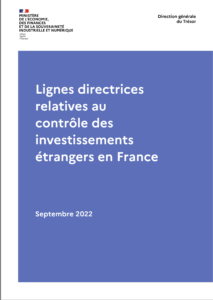
Foreign Direct Investment screening in France – French FDI regime
Framework – Conditions – Procedure – Resources
Foreign Direct Investment screening in France – French FDI regime
Foreign investment control in France is a regulatory procedure whereby the Minister of the Economy assesses whether a foreign investor’s acquisition of an interest in a French company or legal entity governed by French law—operating in a sensitive sector related to national defense, public order, or public security—may adversely affect national interests.
The Minister has a period of 30 to 75 days to issue a decision.
This framework is intended to safeguard France’s economic security and ensure the protection of its sovereignty.
Foreign investment control constitutes a derogation from the general principle of freedom of investment in France, insofar as it requires prior authorization from the Minister.
What Are the Conditions for Triggering Foreign Direct Investment screening in France (French FDI regime) ?
Three cumulative conditions must be met:
- The investor must qualify as a foreign investor;
- The investment must involve a French-law entity, meaning an investment that results in the acquisition of any form of control or decisive influence over a French company, or the holding of at least 10% of the share capital if the company is publicly listed;
- The target entity must be engaged in a sensitive activity.
How Is the Foreign Nature of the Investor Defined Under France ‘s Foreign Direct Investment screening – French FDI regime ?
The French foreign investment control framework (FDI Control) identifies four criteria to qualify an investor as foreign:
- Any natural person of foreign nationality;
- Any French national who is not domiciled in France within the meaning of Article 4 B of the French General Tax Code;
- Any legal entity governed by foreign law;
- Any legal entity governed by French law that is controlled by one or more persons or entities referred to in points 1, 2, or 3 above.
What Constitutes an Investment Under France’s Foreign Direct Investment screening – French FDI regime ?
FDI control in France applies to any foreign investment targeting a French-law entity.
- Eligible investments include those resulting in the acquisition of control over the target entity. However, the acquisition of control following the crossing of a previously authorized threshold is not subject to review.
- Eligible investments also include the full or partial acquisition of a business line or branch of activity of the target entity.
- Eligible investments further include those resulting in the crossing of certain voting rights thresholds within the target entity. As with control acquisitions, the crossing of a voting threshold after prior authorization of control is not subject to a new review.
Exceptions:
- The FDI control mechanism does not apply to investments involving the mere creation of a French-law entity.
- It also does not apply to intra-group transactions.
Which Activities and Sectors Are Subject to Foreign Direct Investment screening in France – French FDI regime ?
France’s foreign investment control regime applies to specific sensitive sectors and activities grouped into three categories:
Activities Sensitive by Nature
These are activities that may affect national defense interests, involve the exercise of public authority, or could undermine public order and public security. They include:
- Activities related to arms, munitions, gunpowder, and explosive substances;
- Activities involving dual-use goods and technologies;
- Activities carried out by entities holding national defense secrets;
- Activities in the field of information systems security;
- Activities conducted by entities under contract with the Ministry of the Armed Forces;
- Activities involving cryptology products and services;
- Activities related to technical equipment or devices that enable the interception of communications;
- Activities involving the evaluation and certification of information technology product and system security;
- Activities related to gambling;
- Activities involving measures to counter the illicit use of pathogenic or toxic agents;
- Activities involving the processing, transmission, or storage of data.
Activities Involving Critical Infrastructure, Goods, or Services
These concern infrastructures, goods, or services that are essential to ensuring:
- The integrity, security, or continuity of energy supply;
- The integrity, security, or continuity of water supply;
- The integrity, security, or continuity of transport networks and services;
- The integrity, security, or continuity of space operations;
- The integrity, security, or continuity of electronic communications networks and services;
- The fulfillment of missions by the national police, national gendarmerie, civil security services, prison security services, customs public security services, and approved private security firms;
- The integrity, security, or continuity of the operation of vital infrastructure, facilities, or structures;
- The protection of public health;
- The production, processing, or distribution of agricultural products contributing to national food security objectives;
- The publication, printing, or distribution of political and general news media;
- The integrity, security, or continuity of the extraction, processing, and recycling of critical raw materials.
Research and Development Activities and Sensitive Technologies
This category includes R&D activities involving dual-use items, as well as a list of critical technologies:
- Cybersecurity;
- Artificial intelligence;
- Robotics;
- Additive manufacturing;
- Semiconductors;
- Quantum technologies;
- Energy storage;
- Biotechnologies;
- Technologies involved in low-carbon energy production;
- Photonics.
What Are the Main Stages of Foreign Direct Investment screening in France – French FDI regime ?
France’s FDI control procedure is divided into two main phases:
Phase 1: Initial Review
This is the preliminary assessment stage.
Its duration is limited to a maximum of 30 business days.
At the end of this phase, the Minister of the Economy may:
- Declare that the investment operation does not fall within the scope of the FDI control mechanism;
- Authorize the investment without imposing any conditions;
- Decide to open a detailed review (Phase 2).
Phase 2: In-Depth Review
This second phase may last up to an additional 45 business days.
At the conclusion of this phase, the Minister may:
- Authorize the investment subject to specific conditions aimed at protecting national interests;
- Authorize the investment without conditions;
- Deny the investment authorization.
What Are the Legal Texts Governing Foreign Direct Investment screening in France – French FDI regime ?
The principles, exemptions, and enforcement measures related to foreign investment control in France are set out in Articles L.151-1 et seq. of the French Monetary and Financial Code.
- Article L.151-1 establishes the principle of freedom of foreign investment in France, stating that “financial relations between France and foreign countries are free. This freedom is exercised in accordance with the provisions of this chapter and with due regard for France’s international commitments.”
- Article L.151-2 limits this principle by allowing foreign investments to be subject to prior declaration, authorization, or control. Paragraph 1(c) is particularly relevant to FDI control.
- Article L.151-3 defines the scope of the prior authorization regime, focusing especially on the criterion of activity, as detailed in the regulatory part of the Code.
- Article L.151-3-1 outlines the enforcement powers granted to the Minister of the Economy, including injunctions, daily penalties, and precautionary measures such as suspension of voting rights, appointment of a trustee, and restriction on asset disposal or dividend distribution.
- Article L.151-3-2 sets forth applicable financial penalties and conditions for their imposition.
- Article L.151-4 provides for the nullity of any investment completed in violation of the prior authorization regime.
- Article L.151-5 imposes an obligation on the parties to comply with information requests from public authorities, without the possibility of invoking business secrecy.
- Article L.151-6 mandates the Government to submit an annual statistical report to Parliament on FDI control, including breakdowns by investor origin and economic sector. A parliamentary debate may be held on this basis.
- Article L.151-7 establishes parliamentary oversight of foreign investment operations reviewed by the Minister.
The regulatory provisions in Articles R.151-1 et seq. specify the scope and operational procedures for FDI control in France:
- Article R.151-1: Defines a foreign investor.
- Article R.151-2: Defines what constitutes an investment in a French-law entity, including relevant thresholds.
- Article R.151-3: Lists the 23 sensitive activities of national interest.
- Article R.151-4: Concerns the preliminary review request.
- Article R.151-5: Governs the filing of a prior authorization request.
- Article R.151-6: Establishes the 30- and 45-business-day review timelines.
- Article R.151-7: Details exemptions from prior authorization.
- Article R.151-8: Covers conditions imposed on authorizations.
- Article R.151-9: Covers modification of imposed conditions.
- Article R.151-10: Covers ministerial refusal of authorization.
- Article R.151-11: Concerns acknowledgment of receipt for filings.
Articles R.151-12 to R.151-15 address enforcement and sanctions:
- Article R.151-12: Provides for a formal notice procedure.
- Article R.151-13: Details the Minister’s powers of injunction.
- Article R.151-14: Establishes the regime of daily penalties.
- Article R.151-15: Provides for the appointment of a court-appointed trustee.
Common Provisions
- Article R.151-16: Concerns the composition of the application files (preliminary review or authorization request).
- Article R.151-17: Allows for international cooperation.
Complementary Texts:
- Order of 31 December 2019: Specifies the list of required documents and sensitive technologies for FDI filings.
- Decree No. 2023-1293 of 28 December 2023: Lowers the threshold for FDI control in publicly listed companies to 10%.
- Article 459 of the French Customs Code: Governs litigation related to financial relations with foreign entities.
- Regulation (EU) 2019/452 of 19 March 2019: Establishes a framework for the screening of foreign direct investments into the European Union.
Useful Links – Foreign Direct Investment screening in France – French FDI regime
Official page of the Directorate General of the Treasury – Ministry of the Economy and Finance
Foreign Investment Control in France – Authorization and Prior Review Procedures
Contrôle des Investissements étrangers en France – DGTresor
Online Portal for Foreign Investment Control Filings (FDI Control)
The Foreign Investment Control Platform allows investors to submit prior authorization requests for foreign investments in accordance with Article R. 151-3 of the French Monetary and Financial Code.
FDI Control Guidelines issued by the Ministry of the Economy
Guidelines on Foreign Investment Control in France – FDI Control
FDI Control Guidelines issued by the Ministry of the Economy
To learn more (French)
Our Expertise
Relians is a strategic and institutional advisory firm that has been supporting companies facing these challenges for over 20 years. Drawing on deep expertise in regulatory texts, administrative practices, and applicable guidelines, expert in French FDI regime, we help our clients structure their transactions securely, in full compliance with regulatory requirements and in a spirit of constructive engagement with the French authorities.
Relians – Specialist in Foreign Investment Screening.


